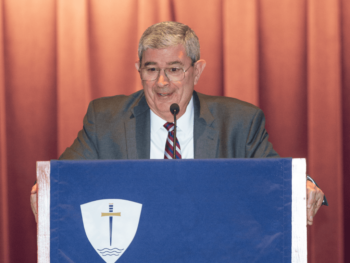The Saint Paul Seminary Institute for Catholic School Leadership equips educational leaders to foster a vibrant Catholic culture, cultivate spiritual and academic excellence, and apply executive management skills to strengthen their schools.
Doable. Flexible. Affordable.
Over 20,000 elementary, middle and high school students have been positively influenced by graduates of the Institute for Catholic School Leadership.
The institute offers a Certificate in Catholic School Leadership earned in a hybrid on-line/in-person learning environment during a 14-month period. Thanks to our benefactors, students who are accepted to the 2024 cohort will pay $1,000 in tuition for the certificate program. Additional sources of funding are also available.
As part of the broader seminary community, the institute also contributes to the formation of future priests and collaborates with the Institute for Ongoing Clergy Formation to enhance the critical relationship between pastors and principals as they strive for excellence in Catholic schools.
Interested in a graduate leadership degree?
The Certificate in Catholic School Leadership can serve as the pathway toward a Master's.


What is Contemplative Leadership?
Contemplative leadership is a leadership model for the Catholic educational context that includes prayerful reflection (contemplation) and intentional decision making (action). The goal of contemplative leadership is to facilitate the creation of a Catholic faith-filled school community. A contemplative school leader understands the vocation of Catholic educator and the ministry of Catholic education.
Where are the theoretical roots of contemplative leadership?
What distinguishes contemplative leadership practice is the integration of three theoretical underpinnings (character, leadership, reflection) that necessitate a Catholic school leader to think about their own thinking within an integration of their professional knowledge and their character. The impact of virtues, special communities and life stories, on shaping beliefs, worldview, and decisions demonstrates the character of a Catholic school leader. Contemplative Catholic school leaders deliberate about the consequences of their decisions in relation to Gospel values, Catholic theology and Church tradition. Coherence between beliefs and behaviors is essential for contemplative leadership.
What does contemplative leadership look like in practice?
Within contemplative practice, leadership behaviors include implementing a transformational vision, creating supportive conditions for learning, participatory governance structures and community building activities. In turn, the contemplative leader encourages teacher behaviors that include an emphasis on faith integration across the curriculum, discipline strategies that highlight personal responsibility and a Catholic worldview infused into daily classroom life. Contemplative leadership practice inspires a faith learning community for holistic student development.
Three examples of contemplative leadership.
Catholic Identity
Contemplative practice and Catholic identity are entwined. As a contemplative leader, when I (we school leaders) make decisions for my school community; my thinking is informed by my personal Catholic identity. I consider what my faith teaches about being a Catholic Christian in my role as a school leader. In addition, I consider how my decisions impact the formation of Catholic identity within my school community. For example, are devotions and liturgy given priority in our calendar/scheduling discussions?
Academic Excellence
The contemplative leader is an academic leader with an emphasis on excellence. A contemplative leader reminds the school community of their Catholic Intellectual Tradition that challenges each member to grow in their abilities to use their God-given talents. A contemplative leader encourages and models lifelong learning within their faculty. Teachers, in turn, inspire their students toward high performance in all areas of their curriculum. The contemplative leader’s message is that we all---in this school community---grow and learn to be the best persons we can be to serve God in this world and be with him in the next.
Executive Management
The contemplative leader carries out their executive management responsibilities while considering dilemmas posed by budgets. These include financial aid distribution or balancing the costs of remedial and gifted programs. These financial challenges are exposed to Gospel Values and our responsibility to the poorest and most vulnerable among the community.
The contemplative leader reflects on the rationale for their decisions, the messages sent by their decisions to the school community, and how individuals or groups will be impacted by that decision. Each decision is reflected upon through prayer, our Catholic theology and tradition and communicated through a collaborative process that acknowledges that there is seldom a flawless decision. Therefore, the consequences of the decision are evaluated and used to inform future decisions.
Catholic school leadership is a specialized ministry in the Church.
All baptized Christians are called to discipleship and to work toward the transformation of the world. Some (though not all) Christians are called to exercise a specific ministry (or ministries) in the Church. Although there are many different definitions for “ministry,” most have a number of elements in common. Ministry consists of intentional action(s) done in a public context. Ministry involves both serving and leading other disciples of Christ to further the mission of the Church and the Kingdom of God. Ministry is done by those gifted with certain charisms (in other words, ministry is the work of God and of God’s grace in and through the one who does ministry). Ministry is done on behalf of the Church and by those who have been appointed and/or validated through some form of ecclesial authorization. When laity engage in ministry, they do so in close mutual collaboration with the pastoral ministry of the ordained. If we think carefully about the daily lives and activities of Catholic school leaders vis-à-vis these descriptors of ministry, it becomes abundantly clear why their vocation can be described as a specialized ministry of the Church.
Ministry requires formation.
All forms of ministry require preparation and formation. This preparation is not just the acquisition of knowledge or information; nor is it simply the mastering of certain skills. Formation for ministry attends to the whole human person, focusing on the development of the human, spiritual, intellectual, and pastoral attributes necessary for a person to be an authentic and credible witness of the faith. A life of ministry requires that we seek to live virtuous and holy lives, recognizing in humility that we can only do so with the help of God’s grace. Formation for ministry prepares us to become palpable signs and instruments of God’s love and compassion for the world; it should also keep us from ever being a contradiction of that love or an obstacle to others who are seeking to know the presence and love of God in their lives. Ministerial formation does require a certain degree of academic preparation, but this must be carefully integrated and balanced with the other dimensions of formation.
How to take the next step as a Catholic school leader
- Attend an information night or request more info
- Apply for the Certificate in Catholic School Leadership
- Take the course
- Leave prepared for a leadership role in Catholic education
- Join a community of the nation's top Catholic school professionals
Access resources for Catholic school leaders
Sign up for the Catholic School Mission toolkit




